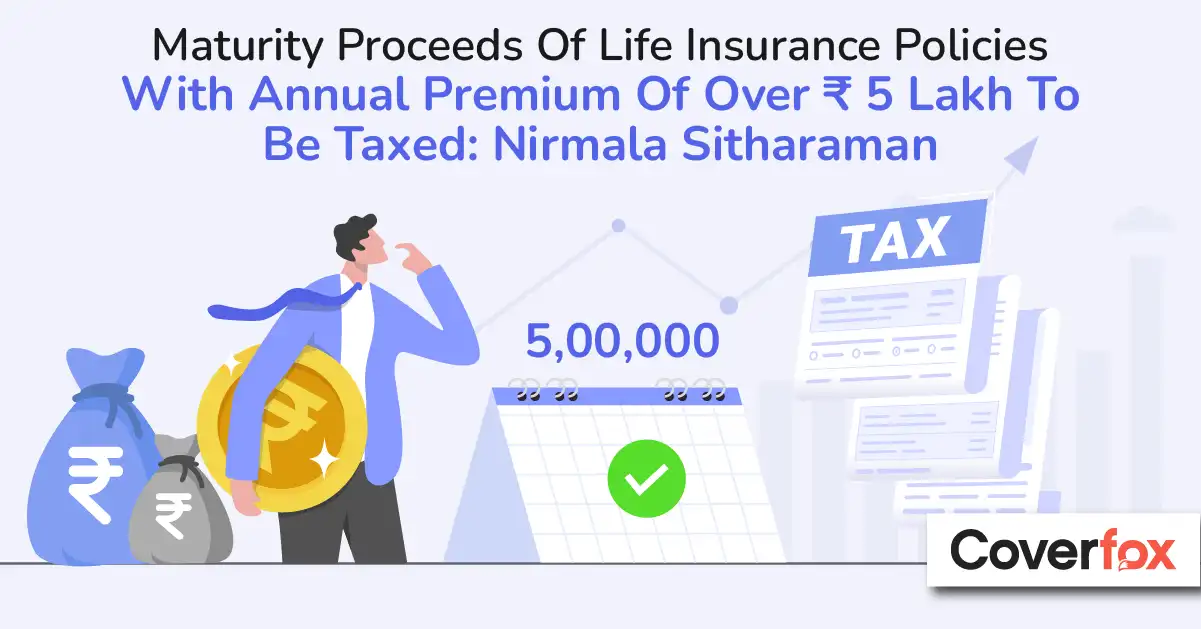The new taxation rule will only have a little effect on the consumers except for the high net worth individuals (HNIs), but it is undoubtedly going to impact the business of insurance companies.

Finance Minister Nirmala Sitharaman, in her Budget 2023 proposal speech, announced that the maturity amount of all life insurance plans (except for ULIPs) issued on or after April 1, 2023, with an annual premium of more than ₹ 5 lakhs will now be taxable. However, all life insurance plans issued till March 31st, 2023, are exempt from this. Also, there is no change in the tax exemptions that are provided to the nominee on receipt of the death benefit.
The high-value traditional insurance policies that combine insurance with the investment will no longer offer tax benefits on maturity proceeds. The union budget announced a premium limit of ₹ 5 lakhs annually to claim tax exemption under section 10(10D) on the life insurance maturity benefit applicable on policies issued on or after April 1, 2023. Maturity benefits from policies with premiums beyond the limit of ₹ 5 lakhs will be taxed as per the applicable tax rate.
How Does This Change Affect The Consumer?
The change in life insurance maturity taxability will affect consumers who prefer traditional policies that offer insurance coverage and investment.
- A consumer will need different policies for different requirements, such as insurance coverage or investment for financial goals.
- A consumer can claim a tax deduction if the combined annual premium of ULIP (tax limit of ₹ 2.5 lakhs) and a non-ULIP insurance plan (tax limit of ₹ 5 lakhs) is upto ₹ 7.5 lakh.
- A consumer with multiple policies must remember that the aggregate premium for all traditional policies should be less than ₹ 5 lakhs in a year to claim a tax deduction. If you use these policies to save tax, fewer policies will exhaust your tax limit.
- A consumer will find traditional plans less attractive because of no tax exemptions and low returns of 4 to 6% compared to ULIPs, mutual funds, and fixed deposits which give higher returns even after being taxable.
- Consumers who buy insurance just for the tax incentive will need to understand the importance of life coverage and saving money.
What should a consumer do?
The new limit will be applicable to the policies purchased after April 1 2023, so policyholders already having such plans will not be affected. Those who are planning to buy a traditional life insurance plan in the coming year can do any of the following,
- Buy insurance before April 1 2023, as the new taxation rule will only affect any policy purchased on March 31, 2023.
- Keep insurance and investment separate to get the maximum benefit of both because a traditional plan will not offer any tax benefits. Additionally, the life cover offered is also insufficient compared to a pure life cover or a term plan, and the returns could be more attractive compared to ULIPs, mutual funds, etc.
Conclusion
Immediately after the announcement of the budget, the stocks of some major insurance providers fell from 4 to 11%. The business of many insurers comes from the premiums earned from such traditional plans.
The biggest concern is the fact that now consumers' interest might shift from traditional plans to pure risk covers. To deal with these changes, insurance providers will have to diversify their product offerings and will have to focus on offering more consumer-centric products.
Also Read: How To Initiate A Life Insurance Claim Upon Maturity?


.jpg)

